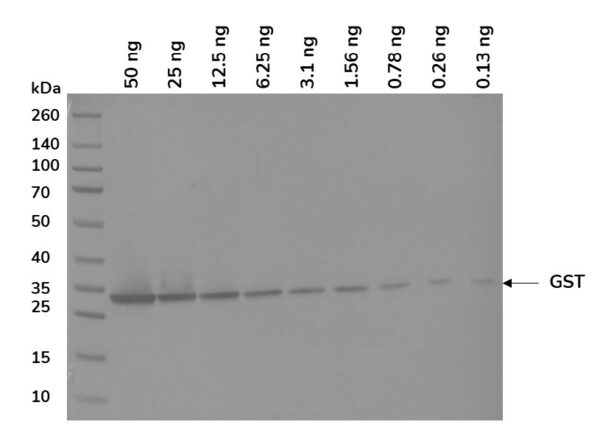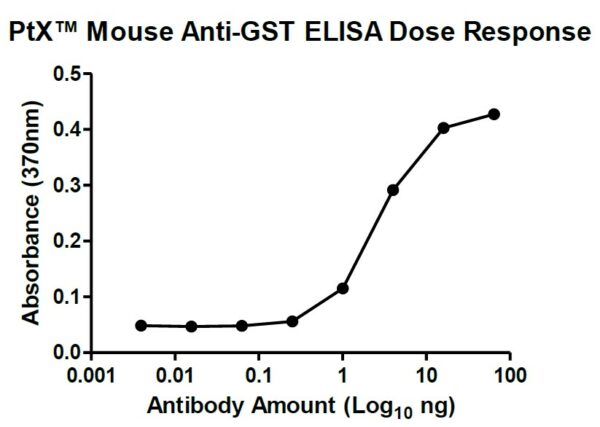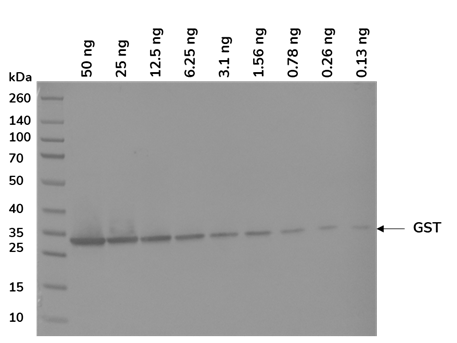PtX™ Mouse Anti-Glutathione S-transferase Recombinant Antibody


Mouse Anti-GST
Recombinant mouse monoclonal antibody against native and denatured forms of glutathione S-transferase (GST). PtX™ Mouse Anti-glutathione S-transferase antibody is produced in Nicotiana benthamiana plants and used in various immunoassays for the detection of purified GST and GST-tagged recombinant proteins.
50 µg | Catalogue Number: CBT_A0018
Download: SDS / Datasheet
View Product
Share:
Glutathione S-transferase (GST) is a detoxification enzyme which catalyses the conjugation of the reduced form of glutathione to hydrophobic and electrophilic compounds of xenobiotic substrates, thereby protecting the host against toxic foreign chemicals and oxidative stress. Anti-GST antibodies are used in a variety of research applications, primarily in protein biochemistry and molecular biology. GST is a commonly used protein fusion tag that is added to recombinant proteins to facilitate their expression, purification, and detection. Anti-GST antibodies are used to detect the presence of the GST-tagged proteins and to isolate them from complex protein mixtures. GST-tagged proteins can be purified from crude lysates using affinity chromatography, whereafter the presence of the GST-tagged protein can be confirmed by western blotting using anti-GST antibodies. This technique is widely used in protein biochemistry and structural biology to isolate and study individual proteins or protein complexes. In addition, anti-GST antibodies are used in a variety of assays to detect the expression and localization of GST-tagged proteins in cells.
Additional information
| Available Unit Size | 0.1mg, 1mg, 10mg, 100mg, 200mg |
|---|
Key Benefits
This product is a plant-made, recombinant monoclonal antibody, which offers several advantages including:
- Can detect recombinant GST in native and denatured forms.
- Protein is fused at the genetic level for increased reproducibility of results.
- No animals or animal products are used in the development of this protein.
For more information on plant-made, recombinant monoclonal antibodies click here.
Datasheet
| Product Name | PtX™ Mouse Anti-Glutathione S-transferase Recombinant Antibody |
| Catalogue Number | CBT-A0018 |
| Expression Host | Nicotiana benthamiana plants |
| Clonality | Monoclonal, recombinant |
| Species and Isotype | Mouse IgG2 |
| Tag | None |
| Reporter Protein | None |
| Description | This product is a full-length Mouse IgG2 recombinant antibody specific to the GST Tag. It was produced in Nicotiana benthamiana plants via Agrobacterium tumefaciens mediated infiltration. |
| Target Name | Glutathione-S-Transferase (GST) |
| Verified Applications | Western blot, ELISA |
| Dilution Range | Western blot (1: 5 000 – 1: 50 000) ELISA (1: 2 000 – 1: 50 000) |
| Concentration | 0.5 mg/ml |
| Form | Liquid |
| Colour | Clear, slight yellow tinge |
| Preparation | Ready to use |
| Storage | Short term (up to one week): 2 – 8 °C Long term: Aliquot and store at – 20 °C Store immediately. Aliquot and avoid multiple freeze thaw cycles. |
| Storage Buffer | 0.1 M Phosphate Buffered Saline, pH 7.4 Preservative: None |
| Purification Notes | This product was purified using Protein A affinity chromatography. |
| Purity | ≥ 90 % as determined by SDS-PAGE |
| General Notes | If for any reason the product does not perform as specified, please contact our scientific support team for assistance by emailing . |
Images

Figure 1. ELISA Dose Response curve using PtX™ Mouse Anti-GST to detect coated GST Antigen at 0.05 ng/µl and increasing concentrations of antibody. Experiments were performed in triplicate, with error bars representing standard deviation (SD).

Figure 2. Western blot of decreasing amounts of GST antigen (28 kDa) detected with PtX™ Mouse Anti-GST Recombinant Antibody at 1:5 000 and an HRP conjugated anti-mouse secondary antibody.
PtX™ | Plant-Based Expression
The biotechnology behind the development and manufacture of this product, transient plant-based expression, effectively turns Nicotiana benthamiana plants into single use, biodegradable bioreactors. Infiltrating this plant species with Agrobacterium tumefaciens cells, transformed with our proprietary plant expression vectors, allows rapid production of a wide variety of recombinant proteins. Plants are harvested and proteins extracted by various stages of filtration, clarification, purification, and polishing – resulting in a highly functional final product.
Visit our Technology page to learn more.



